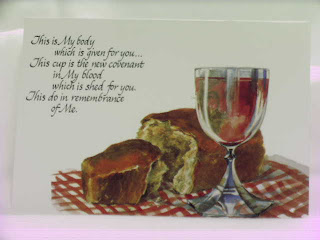
The new covenant. This passage in Ezekiel is called The New Covenant. Throughout the Old Testament, God has made some promises, some covenants, with the people. God promised Noah that God wouldn't wipe out the world again with a flood, no matter how off track things were. God promised Abraham that God would bless him and make of him a great nation so that by him all the world would be blessed. God promised the Israelites in the desert that God would be their God and they would be God's people - and God gave them the 10 Commandments to help them learn how to be God's people.
Time and again God reaches out to the people to create a relationship with them, and time and again the people go astray. The people try to follow God's law, but they can't. It's just too hard. They fall into sin and greed. They fight amongst one another, creating civil war and chaos in the land that God gave them. It's just a mess.
So God needs a new plan. God needs to find a way to bring the people into relationship with God so that the people will be able to live into the harmony and goodness that God intended for creation. But how to do that? Ah...the new covenant.
In this covenant, God promises first to cleanse them, to forgive them. God will wash away all of their sins and start over again with them. Then, God promises to give them a new heart. They are all so scared and bitter and angry, their hearts are made of stone. But, God will melt away all that ugliness and give them hearts of flesh - hearts that can love again. And finally, God will put God's spirit within them. No longer will they have to find God in the law, no longer will God be available to them only in the rituals of the law, God will be within them. They will each have access to God and God's will for them right in their own hearts.
This is the promise, the covenant, that comes true in Jesus. In Jesus we are cleansed, forgiven. In Jesus we are transformed from scared, angry, and suspicious people to people who are full of love and gratitude. In Jesus we know God; each and every one of us can know God personally and find God's Spirit living within us. Thus Jesus says, "While they were eating, he took a loaf of bread, and after blessing it he broke it, gave it to them, and said, ‘Take; this is my body.’ Then he took a cup, and after giving thanks he gave it to them, and all of them drank from it. He said to them, ‘This is my blood of the new covenant, which is poured out for many. Truly I tell you, I will never again drink of the fruit of the vine until that day when I drink it new in the kingdom of God.’"
As we approach Easter, we prepare ourselves to embrace the new covenant. We spent time in Lent recalling our mistakes and our sins so that we can really allow God to forgive us, and in that forgiveness we find that we are transformed - our hearts are turned from stone into flesh, from filled with bitterness and anger to full of love. And as we consume the bread and the wine at communion we feel God's Spirit come directly into us.






